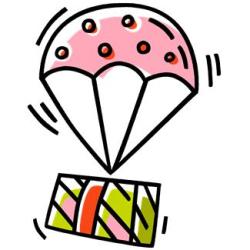Source Institutions
Source Institutions
Add to list Go to activity
Activity link broken? See if it's at the internet archive

In this math lesson, learners determine and compare the rate of descent of various learner-constructed parachutes. Learners construct parachutes that will have maximum hang times. Learners then drop their parachutes from a height of two meters and record the hang times. Using the distance formula, learners compute the rate of descent and record the data. Learners then arrange the parachutes in terms of hang time and examine the shapes for patterns. (Note: for low-mass parachutes like the ones made here, the terminal velocity is reached very quickly, so the rate of descent will be approximately constant. However, you may want to explain to your learners that in many problems related to falling, the descent rate will vary considerably with time. As a result, in most cases, the distance formula only gives the average velocity for each run.)
- Under 5 minutes
- 45 to 60 minutes
- $1 - $5 per group of students
- Ages 11 - 14
- Activity, Lesson/Lesson Plan
- English
Quick Guide
Materials List (per group of students)
- Plastic trash bags
- Scissors
- Yard/Meter sticks
- String
- Paper clips or tape
- Aw Chute Data Charts
- Several stopwatches
- Class Chart
- Circular objects (Frisbee, bowl for tracing)
- Markers
Subjects
-
Engineering and Technology
-
Engineering
- Transportation Engineering
-
Engineering
-
Mathematics
-
Algebra
- Equations and Inequalities
- Patterns
-
Data Analysis and Probability
- Data Analysis
- Data Collection
- Data Representation
-
Measurement
- Rate
-
Algebra
-
The Nature of Technology
-
The Design Process
- Invention and Innovation
-
The Design Process
-
Physical Sciences
-
Motion and Forces
- Gravity
- Momentum and Velocity
-
Motion and Forces
-
The Nature of Science
-
The Scientific Process
- Conducting Investigations
- Gathering Data
- Formulating Explanations
- Communicating Results
-
The Scientific Process
Informal Categories
- Model Building
Audience
To use this activity, learners need to:
- see
- read
- be mobile
- touch
Learning styles supported:
- Involves teamwork and communication skills
- Involves hands-on or lab activities
Other
This resource is part of:
Access Rights:
- Free access
By:
Rights:
- All rights reserved, PBS, 2012
Funding Source:
- US Department of Education
